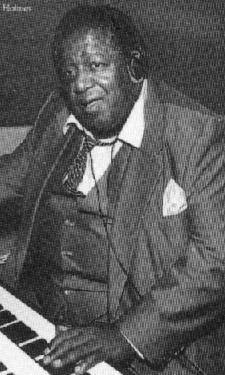Richard "Groove" Holmes |

|
RICHARD "GROOVE" HOLMES was born in Camden NJ on May 2, 1931. He was primarily a bass player who switched to the Hammond organ without formal training on the piano. His self-taught style was infectious with its strong bass line under each tune. Revered in soul-jazz circles, Richard "Groove" Holmes was an unapologetically swinging Jimmy Smith admirer who could effortlessly move from the grittiest of blues to the most sentimental of ballads. Holmes, a very accessible, straight-forward and warm player who was especially popular in the Black community, had been well respected on the Philadelphia/Southern New Jersey circuit by the time he signed with Pacific Jazz in the early 1960s and started receiving national attention by recording with such greats as Ben Webster and Gene Ammons. Holmes, best known for his hit 1965 version of "Misty," engaged in some inspired organ battles with Jimmy McGriff in the early 70s before turning to electric keyboards and fusion-ish material a few years later. The organ was Holmes' priority in the mid-to-late 80s, when he recorded for Muse. Holmes was still delivering high-quality soul-jazz for that label (often featuring tenor titan Houston Person) when a heart attack claimed his life at the age of 60 on June 29, 1991 in St. Louis MO. |
|
|
||
|

Groove was the love of Renee's life, and together they had a beautiful daughter, Tatiana, who is now studying both flute and piano. Renee fondly recalls how Groove was "just a big kid — loved his video games — loved playing pinochle — just a beautiful person and a fantastic father." She continues to promote the music and support all the wonderful friends and musical associates who received and returned Groove's love. Players like Jimmy Smith, Jack McDuff, Trudy Pitts, and Shirley Scott all have warm memories to share about their friend Groove. Shirley, for example, recalls the last time she saw and had occasion to play with Groove. "I hadn't seen him for a while and I knew that he had been ill, but I didn't know the extent of his illness, and when I found out and I saw him, I was devastated because he looked so well and he was strong. I never heard him play better. He never complained. I mean he was just terrific, and l remember that, and I marvel at his strength and how he was able to play as well as he always did." Another fellow organist who knew him well was Johnny "Hammond" Smith. He recalls this wonderful gesture: "I found out where Groove Holmes was, and I talked to him for the last nine or ten months of his life. I used to call him once or twice every a month or so, and I always reminded him how great an organ player he was because I feel Groove got cheated; he was really a tremendous organist. He had foot under control, had tempos under control, had keys under control, and agility on the keyboard. He was just fantastic and some people really didn't hear where he was coming from and didn't give him the just respect that he deserved, so in the last days of his life, I made sure he got it every time I talked to him." The great Jackie Davis shared a mutual admiration with Groove Holmes. His words say it all. "When you're speaking of Groove, you are speaking of a master — a beautiful dude, a fine gentleman, and a classic contributor to the world of music and especially the world of the Jazz organ. That's Groove Holmes, man!" Groove Holmes recorded on the Pacific Jazz, Prestige, Groove Merchant, and Muse labels. Lots of this has been released on CD. Do yourself a real favor and add some of Groove's grooves to your collection! Pete Fallico - June 1994 Doodlin' Lounge and Doodlin' with Pete Fallico are copyright © 1997-2003 Pete Fallico. |
|
| Somethin Special | ? | Pacific Jazz |
| After Hours | 1961 | Pacific Jazz |
| (B.Webster/L.McCann) Groove | 1961 | Pacific Jazz |
| (Gene Ammons) Groovin' With Jug | 1961 | Pacific Jazz |
| Tell It Like It Is | 1961 | Pacific Jazz |
| Somethin' Special | 1962 | Pacific Jazz |
| Book of the Blues | 1964 | Warner Bros. |
| Soul Message | 1965 | Prestige |
| Living Soul | 1966 | Prestige |
| (Boogaloo Joe Jones) Spicy | 1966 | Prestige |
| Super Soul | 1967 | Prestige |
| (T.Edwards/P.Chambers)Get Up And Get It! | 1967 | Prestige |
| (Ben Dixon) Soul Power | 1967 | Prestige |
| Bowl of Soul | 1967 | Loma/Warner |
| See See Rider | 1968 | Prestige |
| The Groover | 1968 | Prestige |
| (Rusty Bryant) That Healin' Feelin' | 1968 | Prestige |
| Onsaya joy | ? | Flying Dutchman |
| Six Million Dollar Man | ? | Flying Dutchman |
| American Pie | 1972 | Groove Merch. |
| Double Exposure | 1973 | LRC |
| Night Glider | 1973 | Musidisc |
| Groovin' and Spoonin' | 1974 | Olympic |
| (Houston Person) Good Vibrations | 1977 | Muse |
| (Idris Muhammad) Shippin' Out | 1977 | Muse |
| (Houston Person) Broadway | 1980 | Muse |
| (Houston Person) Blues All Day Long | 1988 | Muse |
| (Houston Person) Hot Tat | 1989 | Muse |